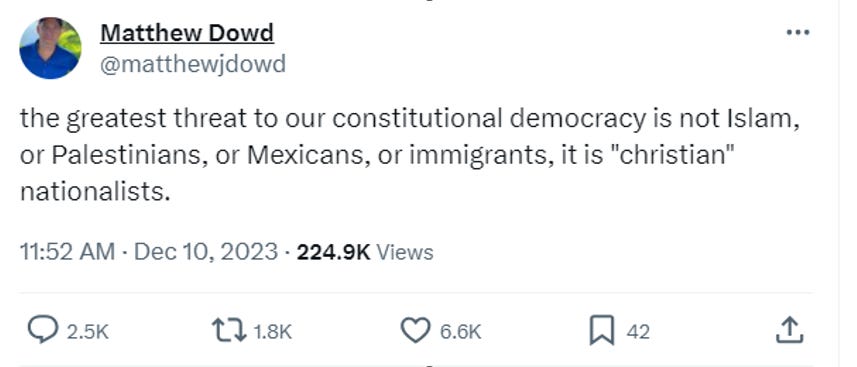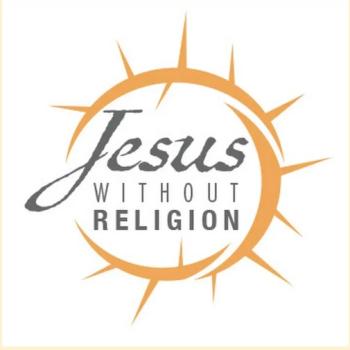
Matthew Doud is getting vocal and loud about the threat of White Christian Nationalism these days. I heard him just the other night on Joy Reid’s show and he said the following:
“The thing that’s happened with the Republican Party is there is no division between the people that are pushing religion and the people that are pushing politics. For the Republican Party, it has become one. And it’s this White Christian nationalism that has completely occupied the Republican Party in America which is out of step with the majority of America.”

Doud is a one-time Republican strategist but left that fold in 2004 during George W. Bush’s administration, just about the same time that I did. The White Christian Nationalist take-over of the Republican party has been an ongoing project since the 1980s. I saw it firsthand and it so sickened me that by the mid-2000s, I left both Christianity and the Republican party.
Quest for Power
When I attended a Republican caucus in Polk County Iowa (Des Moines) in the 1980s the “evangelicals” that were running the caucus (yes, evangelicals control Iowa Republican politics) only wanted one thing…power. They wanted to be in charge so that they could use the coercive power of government to impose their cultural views and values on the whole of society.
But it is the word “POWER” that needs to be the focus. It isn’t just political operatives and pundits like Matthew Dowd who are waving the red flags about this anti-democratic movement that has now subsumed the GOP.
I just finished reading Andrew Whitehead’s book, “American Idolatry: How Christian Nationalism Betrays the Gospel and Threatens the Church.” Many Christians like Whitehead are sounding the alarm. Not all Christians are Christian Nationalists.
I have a great deal of respect for Whitehead who is a professional sociologist and a committed evangelical Christian, although he is almost embarrassed to use that label today. The book is written from the perspective of what the true gospel message of Jesus is, which runs counter to and opposite of the idea that America is a “Christian Nation.”
According to Whitehead the Kingdom of God is boundaryless and not based on political or military power. God loves ALL people and ALL nations. American Christians do not own the Kingdom of God. To proclaim that the United States is “God’s chosen nation” is nothing less than idolatry.
The one major point Whitehead brings up in his book is the abject idolatry that American Christians, especially white Christian Nationalists, show toward crass political power. It is their goal, their aspiration, their main desire, and their golden calf, to use a Biblical metaphor.
Power and the Temptation of Jesus
Since the 1980s, White Christian Nationalism has made achieving political power its primary objective; not evangelization, not applying the teachings of Jesus to “help the least of these.” They want power because they feel their historically privileged position slipping away toward demographic reality. The number of white Christians is declining and is no longer a majority. White Christians mistakenly believe that their weakening privileged status is persecution. Making room for a multi-religious democratic culture has never been part of white Christian America.
Whitehead’s comments reminded me of a section of the New Testament where the issue of power was directly and spiritually confronted by the gospel writers. Matthew 4:5-8 tells the story of Jesus being tempted by the “devil” in the wilderness. This temptation was Jesus’ spiritual purification. Here are the relevant verses:
And the devil took him up and showed him all the kingdoms of the world in a moment of time, and said to him, “To you I will give all this authority and their glory, for it has been delivered to me, and I give it to whom I will. If you, then, will worship me, it will all be yours.” And Jesus answered him, “It is written, ‘You shall worship the Lord your God, and him only shall you serve.’”
Whether or not you believe this to be a true story or not is not the issue. But the message of this passage is stark and clear. Imagine being given the opportunity to have political power and control over all Kingdoms of the earth which would have included Jesus’ own contemporary Roman Empire, Greece, Persia, the Ottoman Empire, Chinese Empires, African Empires, the Communist Empires, the British Empire, and today’s American Empire. Imagine what you could do if you controlled all the earthly kingdoms and power. It is the ultimate “ring” in Tolkein’s “Lord of the Rings” trilogy. Why, you could impose your religious views on everyone and do away with those pesky other religions. You could force everyone to adhere to your cultural values and interpretations of the Bible. You could end the scourge of Communism. You could force compliance with a Christian cultural framework using the coercion of politics and military power to achieve that end. What an opportunity…but there is only one catch.
You Have To Sell Your Soul to the Devil!!!
Jesus saw through the façade and rejected the offer. He said no thanks, there is something more important than all that. He set an example for all his followers to emulate if they would.
Just after this spiritual encounter, Jesus began his public preaching career and clearly and transparently identified his purpose which had nothing to do with political power. It comes from the same Matthew chapter.
In a synagogue in Nazareth, Jesus is given the floor to speak and picks up a scroll that contains verses from the prophet Isaiah. And he reads it:
“The Spirit of the Lord is upon me,
because he has anointed me
to proclaim good news to the poor.
He has sent me to proclaim liberty to the captives
and recovering of sight to the blind,
to set at liberty those who are oppressed,
to proclaim the year of the Lord’s favor.”
And he rolled up the scroll and gave it back to the attendant and sat down. And the eyes of all in the synagogue were fixed on him. And he began to say to them, “Today this Scripture has been fulfilled in your hearing.”
Jesus Would Not Make a Very Good Christian Nationalist
Jesus declared that this was his mission and purpose…not political power! Jesus had already crossed that bridge in his wilderness temptations. He had purified himself of such idolatry. Jesus would not make a very good Christian Nationalist today!
He came to proclaim good news to the poor…now just what would be good news to the poor? Having food security perhaps?
He was bringing liberty to the captive…and what would that good news look like to captives? Freedom, justice, fairness, and support for those who are unfairly incarcerated or suffer under labor enslavement maybe?
He was bringing recovered sight to the blind…what does that mean? Perhaps it means the physical well-being of those in need is attended to and medical care is available to all.
He came to set at liberty those who are oppressed…slavery was rampant then and to the slave, this meant freedom, it meant the poor could not be taken advantage of by wealthy landowners. Liberty for the marginalized. How about ending racism?
None of these goals that Jesus proclaims is part of what White Christian Nationalists have in mind in their idolatrous pursuit of power. Their pursuit of power is the exact opposite of the heart and mission of Jesus.
When was the last time you heard Christian Nationalist leaders promote food programs for the poor, help for the incarcerated, and public health care for the marginalized? Using government power to help people, especially those “others” is just not what Christian Nationalists idolize.
Power to Ensure Privilege of the Group
As Whitehead points out “Christian nationalism is fundamentally concerned with wielding power for the benefit of one’s own group. It is focused on defending “our” rights, practices, history, or privileges.” By extension, defending the rights and privileges of white Christians comes at the expense of any other group.
The threat of White Christian Nationalism isn’t just a threat to our democratic system and form of government, though that is alarming in and of itself. The threat is to the teachings and gospel of Jesus, and the empathy and compassion that Jesus role modeled for us toward the marginalized and destitute. Empathy and compassion are sacrificed on the altar of the golden calf of power.
American evangelical Christianity has already sold its soul to the “devil.” They made a bargain with him and I saw it happen back in the 80s. They have exchanged the good news of the gospel for the selfish and self-aggrandizing appeal of raw political power to protect and expand themselves. It has killed whatever credibility evangelical Christianity might have had before the 1980s. By the 2020s, that credibility is gone, extinct.
Using religious symbols, bible verses, and theological interpretations to justify the pursuit and acquisition of power to protect oneself from your enemies, real or imagined, is not good news. Pretending to be “doing God’s will” when it is your own goal and objective you are chasing is idolatrous.
Christian Nationalism is idolatry.
















